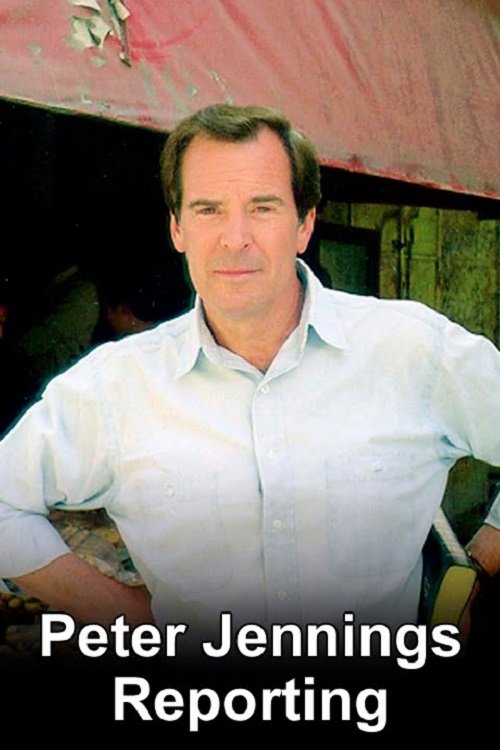
ABC
Featured Show:
The Big Showdown
The Big Showdown is an American game show that aired on the ABC television network from December 23, 1974 to July 4, 1975. Jim Peck hosted the program and Dan Daniel served as announcer. One pilot was taped in 1974, simply titled Showdown. The series was recorded at ABC's New York studios and packaged by Don Lipp and Ron Greenberg, with assistance by MCA Television.
ABC TV Shows
1596 shows • Page 78 of 80
 0
0The Big Showdown
The Big Showdown is an American game show that aired on the ABC television network from December 23, 1974 to July 4, 1975. Jim Peck hosted the program and Dan Daniel served as announcer. One pilot was taped in 1974, simply titled Showdown. The series was recorded at ABC's New York studios and packaged by Don Lipp and Ron Greenberg, with assistance by MCA Television.
 0
0Peter Jennings Reporting
Peter Jennings Reporting was a continuing series of documentaries produced and hosted by ABC News anchor Peter Jennings that aired on ABC. Many of these documentaries were produced by Jennings's production company, PJ Productions, and are currently distributed in DVD format by Koch Vision. The series debuted in 1990. Documentaries include The Search for Jesus in 2000 and Jesus and Paul — the Word and the Witness in 2004. International news was also a focus of these documentaries, covering the tense relations between India and Pakistan, the conflict in Bosnia, the crisis in Haiti, the war in Iraq, and the drug trade in Central and South America. Important domestic issues also reported were gun control policy, the politics of abortion, the crisis in funding for the arts and a highly praised chronicle of the accused bombers of Oklahoma City. The series earned many awards, including the 2004 Edward R. Murrow award for best documentary for The Kennedy Assassination — Beyond Conspiracy.
 0
0Turning Point
Turning Point is an ABC News program that aired from 1994 to 1999. Turning Point was an hour-long documentary program focused on a single topic, making it similar to CBS' 48 Hours, which it ran directly opposite for some of its run. The program tended toward sensational topics, such as former members of Charles Manson's "Family" and much coverage of the O. J. Simpson murder case, which was current for much of the program's run. ABC News figures appearing regularly on the program included Diane Sawyer, Forrest Sawyer, Meredith Vieira, Peter Jennings and Barbara Walters. This Turning Point is not to be confused with an ABC dramatic anthology series of the same title which ran during the 1952-53 television season.
 0
0Author Meets the Critics
Author Meets the Critics was an American talk show which was broadcast by the National Broadcasting Company, American Broadcasting Company, and the DuMont Television Network. The series began as a mid-season replacement on NBC on April 4, 1948, but was transferred to ABC during 1949. The show was transferred back to NBC during 1951, and then to DuMont from January 10, 1952 to October 10, 1954.
 0
0Hollywood Screen Test
Hollywood Screen Test is an American talent show which aired on ABC from 1948 to 1953.
 0
0Everybody's Talking
Everybody's Talking was an American game show which aired on ABC from February 6 to December 29, 1967. Former dance-party host Lloyd Thaxton was the host; Wink Martindale and Charlie O'Donnell were the announcers. Thaxton typically closed each episode by saying, "Keep watching, and keep listening, because everybody's talking!" Veteran producer Jack Barry created this show during a brief period working for Goodson-Todman. Due to lingering bad publicity concerning his possible involvement in the rigging of Twenty One and Tic-Tac-Dough in the late 1950s, he asked that his name be kept off the credits. Jerome Schnur Productions packaged the show instead. It was the last American daytime television program aired in Black and White despite the big 3 commercial networks converted to color by September 1967.
 0
0Warner Bros. Presents
Warner Bros. Presents is the umbrella title for three series telecast as part of the 1955-56 season on ABC: Cheyenne, a new Western series that originated on Presents, and two based on classic Warner Bros. films, Casablanca and Kings Row. While neither a critical or popular success, this wheel series is an historically important program. Perhaps most significantly, it is the first television program of any kind made by Warner Brothers. It was also the original home of Cheyenne, the first hour-long television Western series and the first wholly original television series produced by a major Hollywood studio. It also allowed ABC, then a junior player in American television, to secure its first advertising contracts with commercial giants General Electric and tobacco company Liggett & Myers.
 0
0Think Fast
Think Fast was an American quiz show that ran on ABC from March 26, 1949 to October 8, 1950. The program revolved around a group of five panelists who would compete to see who had the most to say about a particular subject. They sat at a large table, each getting a chance to sit at the "King's" throne by out talking the others on subjects decided by the host. The regular panelists were Leon Janney, David Broekman, who was also the show's musical director, and Eloise McElhone. The moderator was Mason Gross for the first episodes, then Gypsy Rose Lee afterward. The series originally aired on Saturdays until April, followed by Fridays until September, then Sundays for the rest of its run.
 0
0AM America
AM America is a morning news program produced by ABC in an attempt to compete with the highly rated Today on NBC. The show never found an audience after its premiere on January 6, 1975. Lasting just under ten months, its final installment aired on October 31. The program's concept was based on Ralph Story's AM, the local morning show on the network's owned-and-operated Los Angeles station KABC-TV. Like Today, AM America employed two hosts and a news anchor. ABC chose Bill Beutel, who was co-anchor of Eyewitness News on the network's New York City flagship station WABC-TV, and Stephanie Edwards from Ralph Story's AM to host the program. Peter Jennings, who at the time was ABC's Washington correspondent, provided the news reports. One notable episode of AM America aired on April 25, 1975, when members of the British comedy troupe Monty Python made one of their earliest appearances on American television. Edwards quit the show by the end of May, and Beutel followed her out a few months later. On November 3, the Monday following its final broadcast, AM America was replaced by Good Morning America.
 0
0Before They Were Stars
Before They Were Stars is a 1996 30-minute American ABC television show which was hosted by Scott Baio, with John Cramer as announcer and narrator; it was preceded by four specials, each an hour long. The term "Before They Were Stars" has since become widely used by television shows and magazines when featuring segments and articles on famous actors in their lesser-known performances.
 0
0Showoffs
Showoffs is an American game show which ran on ABC from June 30 to December 26, 1975. Bobby Van was host, with Gene Wood as announcer. The Mark Goodson-Bill Todman production involved two teams competing in a game of charades.
 0
0Strictly Dancing
Strictly Dancing is an Australian television show that aired between 2004 and 2005 on ABC TV. Hosted by Paul McDermott, the show is a form of dance competition, with each episode featuring four dance couples from around Australia and New Zealand. The competition has three rounds, each consisting of two similar dance types. The styles range from basic traditionals, such as Cha-Cha and Rumba, to modern styles of Hip-Hop, to strange hybrids. Competitors are picked via auditioning, which is done around Australia before each season. Chosen competitors are alerted three weeks in advance of their appearance of their dances and competition date. Whilst the actual show is only a half-hour segment and appears to be live, the creation takes over eight hours and competitors usually have ample time to return home and watch themselves on TV, and as such are made to sign a contract forbidding them from revealing their final position. Scoring is done by three judges, with the score out of 10 for each dance, with the average of the three being the score being an average of the three. All scores are then added up. On top of the dance score, the judges award the dances at the end of the show with an X-Factor score. This score has no relation to the technical side of the dancing, but relates to the other factors that improve the dance, such as dancers compatibility or energy. This makes things more interesting as a technically better dance couple may lose to a couple who appeared more captivating or simply 'worked better' together. The winner of the round qualifies for the semi-finals. The winner of the finals receives a cash prize and a flower bouquet. The runners up receive a cash prize of half the first prize amount.

Second Chance
Second Chance is an American game show that ran from March 7, 1977 to July 15, 1977 on ABC. Jim Peck hosted, with Jay Stewart and Jack Clark serving as announcers. Second Chance is the predecessor to the CBS game show Press Your Luck, and was produced by The Carruthers Company. Artist and animator "Savage" Steve Holland, later a film director, used Second Chance's Devils as his model for the "Whammy" on Press Your Luck.

Make a Wish
Make a Wish is an American children's television series which ran on ABC from 1971 to 1976. Produced by ABC News, it was hosted by musician Tom Chapin and created and produced by Lester Cooper. It replaced Discovery, a similar series for children also produced by ABC News. Each episode of the series, broadcast on Sunday mornings, focused on a particular theme. One episode, for instance, was about snakes, and another was about motorcycles. Chapin would introduce the topic in much the same manner: "I think a snake is what I'll be. Imagine all the possibilities." After that there would be a sort of free association presentation on the theme featuring stock footage, animation, and Chapin's music and voiceover commentary. The quick-cutting, free-association, stream-of-consciousness style of the show caused Chapin, years later on a talk show, to describe Make a Wish as "a show for six-year old speed freaks." The series won a Peabody Award for Best Children's Series in 1971. Some songs performed on the show were written by Tom's brother, Harry Chapin. General composer of the show was Bernard Green, who also wrote the music to the title song "Make a Wish," with lyrics by Cooper, sung by Chapin.
 0
0Animals, Animals, Animals
Animals, Animals, Animals is an educational television series on ABC about different species of animals. The program, produced by ABC News, was hosted by Hal Linden. Information about animals was provided by Roger Caras and, songs about animals were performed by Lynn Kellogg, who also performed the opening theme song. Zoo personnel and animal researchers frequently appeared on the show. During segments about animals, voiceover was provided by Estelle Parsons and Mason Adams. The show first aired in 1976, replacing Make a Wish on ABC's Sunday morning schedule. The series won Emmies for four consecutive years and the Peabody Award. 1978 Emmy Award for Outstanding Children's Informational Series. Animated segments were provided by Al Lowenheim, Arland Barron, Jeff Melquist, Jim Comstock, Ray Pointer, and Stacey Mann of Lions' Den Studio and David Labelle of David Labelle Animation Studios. Five years later, in 1981, Animals, Animals, Animals was replaced by This Week with David Brinkley; this marked the end of ABC's scheduling of children's programming on Sunday mornings, a practice which began with Discovery in the 1960s.
 0
0Professional Bowlers Tour
The Professional Bowlers Tour, also known as Pro Bowlers Tour, is a broadcast of the Professional Bowlers Association that aired on ABC from 1961 to 1997. In the telecasts, Chris Schenkel and the graphics displayed during the show would refer to the show as "The Professional Bowlers Tour", possibly to disambiguate from the NFL's use of the term "pro bowler" when referring to players who were selected for the Pro Bowl - an event also televised on ABC for many years.
 0
0The Reel Game
The Reel Game was an American game show that aired on ABC from January 18 to May 3, 1971. The series was hosted by Jack Barry and announced by Jack Clark. This show marked Barry's return to producing shows for national television after his 13-year hiatus from television after the quiz show scandals of the 1950s.

Home
Home, also referred to as The Home Show, was a daytime informational talk show that aired on ABC from 1988 to 1994. The program was co-hosted by Robb Weller and former Good Morning America co-host Sandy Hill during the first season. Gary Collins hosted the show for the remainder of its run. Co-hosts included Cristina Ferrare, Dana Fleming, Beth Ruyak and Sarah Purcell. Decorating and craft segments were frequently presented by Sally Marshall, Dian Thomas, Carol Duvall and Kitty Bartholomew. Marc Summers and Wil Shriner presented segments on the latest in technology. The show's various directors were Arthur Forrest, Booey Kober, Bob Loudin, Jerry Kupcinet, Paul Forrest and Bob Levy. Mother Love joined the show as the announcer in the final season, replacing Bob Hilton.

Split Second
Split Second is an American television game show which originally aired on ABC from March 20, 1972, to June 27, 1975. The show returned in December 15, 1986 on syndication and ran until September 11, 1987. The show was produced by Stefan Hatos-Monty Hall Productions, and was distributed by Viacom Enterprises in its syndicated season. Tom Kennedy was the host for the original ABC version, with Jack Clark serving as announcer. When the show returned in syndication in 1986, production moved to Toronto and producer and joint creator Monty Hall became the host, with Sandy Hoyt as announcer.
 0
0Make Me Laugh (original)
Make Me Laugh is an American game show in which contestants watched three stand-up comedians performing their acts, one at a time, earning one dollar for every second that they could make it through without laughing. Each comedian got sixty seconds to try to crack the contestant up.